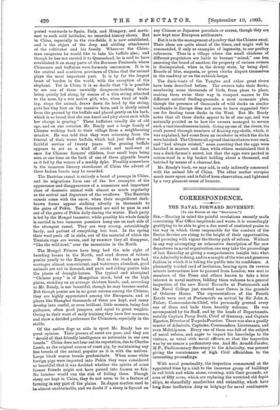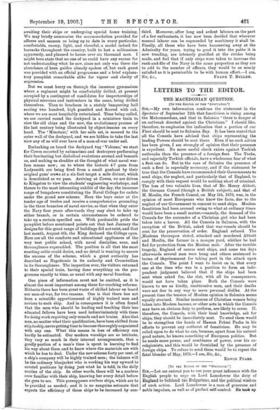CORRESPONDENCE.
THE NAVAL FORWARD MOVEMENT.
[TO THE EDITOE OD THE "SPECTATOR.")
Sia,—Bearing in mind the painful revelations recently made concerning War Office ineptitude and waste, it is exceedingly gratifying to be able to give a due meed of unstinted praise to the way in which • those responsible for the conduct of the Senior Service are rising to the height of their opportunities, and pursuing with vigour the thorny path of reform. Without in any way attempting an exhaustive description of The new departures in naval organisation, one may take the proceedings of last Saturday as giving a comprehensive insight into what the Admiralty is doing, and as a sample of the wise and generous fashion in which it is taking the public into its confidence.. A pleasantly worded card of invitation, bearing upon its reverse minute instructions how to proceed from London, was sent to members of the Press and others known to take a keen interest in naval matters, bidding them welcome to a general inspection of the new Naval Barracks at Portsmouth and the Naval College just erected near Cowes in the grounds of Osborne House. The representatives of the Fourth Estate were met at Portsmouth on arrival by Sir John A. Fisher, Commander-in-Chief, who personally greeted every one of them and bade them heartily welcome. He was accompanied by his Staff, and by the heads of Departments, notably Captain Percy Scott, Chief of Gunnery, and Captain Egerton, Director of Torpedo Practice. There was also a goodly muster of Admirals, Captains, Commanders, Lieutenants, and even Midshipmen. Every one of them was full of the subject of naval reform, and eager to impart his knowledge to the visitors, as usual with naval officers, so that the inspection was by no means a perfunctory one. And Mr. Arnold-Foisfer, M.P., Parliamentary Seeretary to the Admiralty, was present giving the countenance of high Civil • officialdom to the interesting proceedings.
With naval punctuality, the inspection commenced at the appointed time by a visit to the immense group of buildings in red brick and white stone, covering, with their grounds, an area of fifty acres, which are replacing the wretched old depot ships,. so shamefully .comfortless and unhealthy, which have long done ineffective duty as lodgings for naval contingents
awaiting their ships or undergoing special home training. We may briefly summarise the accommodation provided for officers and seamen as being up to date in every particular, comfortable, roomy, light, and cheerful, a model indeed for barracks throughout• the country, built to last a millennium apparently, and planned to house over six thousand men. I might here state that no one of us could have any excuse for not understanding what he saw, since not only was there the abundance of keen guides already spoken of, but each guest was provided with an official programme and a brief explana- tory pamphlet remarkable alike for vigour and clarity of expression.
But we must burry on through the immense gymnasium where a regiment might be comfortably drilled, at present occupied by a contingent of candidates for inspectorships of physical exercises and instructors in the same, being drilled themselves. Then to luncheon in a stately banqueting hall seating two hundred, high panelled and floored with oak, where we are most hospitably entertained. Time being called, we are carried round the dockyard in a miniature train to view the old ships and the new, the evolutionary process of the last century being illustrated by object-lessons on every hand. The Minotaur,' with her sails set, is moored to the outer wall of the dockyard, and we are bidden to take the last view any of us will ever have of a man-of-war under sail.
Embarking on board the dockyard tug Volcano,' we start for Cowes escorted by submarines and destroyers performing their fascinating but diabolical evolutions around and beneath us, and making us shudder at the thought of what naval war- fare means now ; on to where the historic 41 guns from Ladysmith are being fired from a small gunboat by their original guns' crews at a six-foot target a mile distant, which is demolished as we pass. Arriving at Cowes, we are driven to Kingston to view the students' engineering workshops, and thence to the most interesting exhibit of the day, the immense range of bungalows constituting the Naval College for cadets under the grand new scheme. Here the boys enter at the tender age of twelve and receive a comprehensive grounding in the three branches of naval service, so that when they enter the Navy four years afterwards they may elect to take up either branch, or in certain circumstances be ordered to take up a certain specified one. With pardonable pride the pamphlet before mentioned points out that last January the designs for this great range of buildings did not exist, and that last month, August 4th, the King declared the College open. Here are-all the comforts and educational appliances of the very best public school, with naval discipline, 77,0112, and thoroughness superadded. The position is all that the most exacting critic could desire, and no detail is wanting to assure the success of the scheme, which a great authority has described as Napoleonic in its audacity and Cromwellian in its thoroughness. The inspection over, the visitors returned to their special train, having done everything on the pro- gramme exactly to time, as usual with any naval function.
One piece of information must not be omitted, as it is almost the most important among these far-reaching reforms. Hitherto there has been great waste of skilled labour on board our men-of-war, for two reasons. One is that there has not been a scientific apportionment of highly trained men and novices to each ship. And in consequence it is often found that the men who should be leading and teaching their less educated fellows have been used indiscriminately with them for doing work requiring only muscle and not brains. Also that men, no matter what their qualification, have been shifted from ship to ship, never getting time to become thoroughly acquainted with any one. What this means in loss of efficiency can hardly be estimated. Our modern warships are so intricate, they vary so much in their internal arrangements, that a goodly portion of a man's time is spent in learning to find his way about them and to know where the materials are with which he has to deal. Under the new scheme forty per cent. of a ship's company will be highly trained men; the balance will be the ordinary bluejacket who is working his way upward to coveted positions by doing just what he is told, in the daily routine of the ship. In other words, there will be a nucleus crew familiar with their ship, knowing her every detail before she goes to sea. This presupposes nucleus ships, which are to be provided as needed ; and it is no sanguine estimate that expects the efficiency of these ships to be increased by one-
third. Moreover, after long and ardent labours on the part of a few enthusiasts, it has now been decided that wherever manual labour can be superseded by machinery it shall be. Finally, all those who have been hammering away at the Admiralty for years, trying to goad it into the paths it is now treading, are intensely gratified at the strides being made, and feel that if only steps were taken to increase the rank-and-file of the Navy in the same proportion as they are to add to the number of officers, they would be as nearly satisfied as it is permissible to be with human effort.—I am,







































 Previous page
Previous page